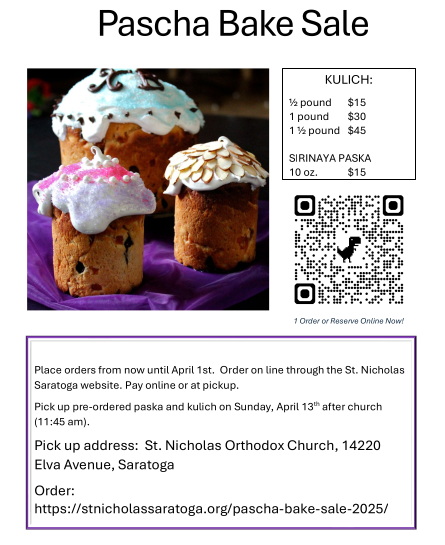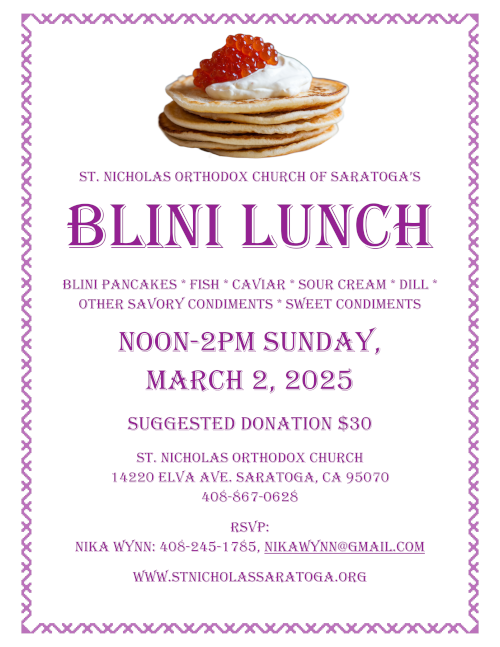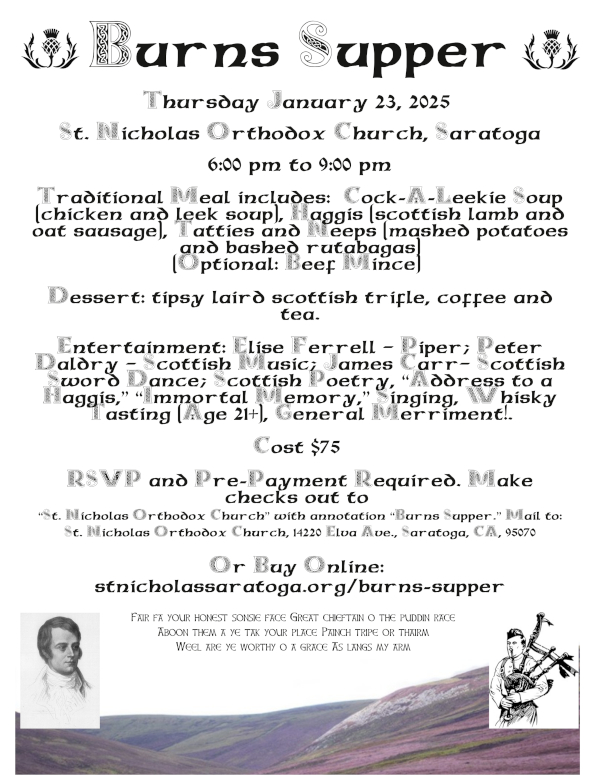
A Paschal Appeal Letter for 2025
Christ is Risen!
Dear Faithful Parishioners and Friends in Christ,
As we approach Pascha, the most profound time of joy and hope in the Church year, we are reminded of the transformative power of our Lord Jesus Christ's sacrifice on the Cross and His third-day resurrection. At St. Nicholas Orthodox Church, we celebrate this momentous occasion every year with a special offering, and we invite you to join us in sharing in this act of faith and generosity.
This Pascha we are particularly focused on bringing our income levels up to match the needs of our bare-bones budget. Additionally, we are looking at some major improvements to be made in the very near future, such as buying, shipping, and mounting our brand-new cupola to replace the ancient and completely irreparable original one. The buildings and grounds will need some attention as well as the year marches on. Your gift, no matter the size, will help us continue to serve our community and spread the message of God's love.
We are grateful for your ongoing support and partnership in making a difference in the life of the parish and in the lives of others. Your generosity and your charity allow us to continue the church's salvific work here in the Silicon Valleyand beyond. Please consider making a special Easter offering to help us continue this important work. You can give online at www.stnicholassaratoga.org, or by placing your offering in the collection plate during any of the services or mail it in using the envelope provided. May your Pascha be filled with the joy of the Risen Christ. Christ is Risen!
With heartfelt gratitude,
Archpriest Basil Rhodes – Rector
Other Notes
We can use more flowers to beautify the temple for Pascha. We can use red or white: carnations, roses or lillies. Donations for flowers are also acceptable.
We are still taking sign-ups in the hall for Holy Saturday readings, Agape Meal help (Pascha afternoon), and the all-night psalter reading on Holy Friday. We must fill in all hours, or we will have to cancel this wonderful prayerful practice, so please consider signing up.
Did you know that in addition to this newsletter by email, that you can also sign up to receive or occasional paper mailings (e.g. "snail mail")? You can sign up for both at this page (scroll down for the paper mail sign up):
Subscribe to our Newsletter
2025 Paschal Season Services Schedule
Saturday, April 12 – Lazarus Saturday
10:00 AM – Divine Liturgy
6 PM - Great Vespers
Sunday, April 13 PALM SUNDAY
10 AM - Divine Liturgy followed by Procession and BAKE SALE
7 PM - Bridegroom Matins
Monday, April 14 Holy Monday
7 PM - Bridegroom Matins
Tuesday, April 15 Holy Tuesday
7 PM - Bridegroom Matins
Wednesday, Apr 16 Holy Wednesday (wine, oil)
10:00 AM – Presanctified Liturgy
6 PM – Sacrament of Holy Unction
Thursday, Apr 17 Holy Thursday (wine, oil)
10 AM – Vesperal Liturgy of the “Last Supper”
7 PM – Matins with Twelve Passion Gospels
Friday, Apr 18 Great and Holy Friday (Strict Fast)
8 AM - Royal Hours
2 PM - Burial Vespers (Taking Down from the Cross)
7 PM - Matins with Lamentations/Praises (with procession)
Saturday, Apr 19 Holy Saturday (wine)
11 AM – Vesperal Liturgy (with 15 Old Testament Readings)
11:15 PM – Nocturns/Matins/Liturgy for PASCHA (with procession) and Blessing of Baskets
Sunday, Apr 20 PASCHA
2 PM – Vespers (Followed by Agape Lunch (Potluck)
Upcoming Events
Upcoming events this month are in the online calendar, which you can subscribe to on your phone or tablet. Use the print button on the calendar to print a copy.
Click below to print a copy of this newsletter:






